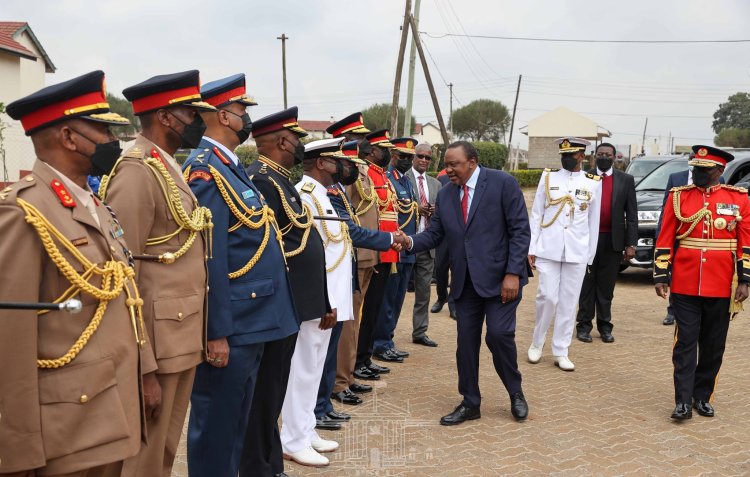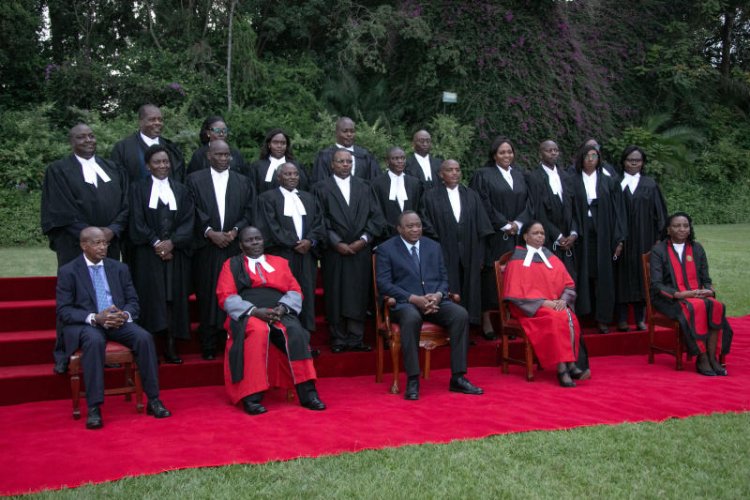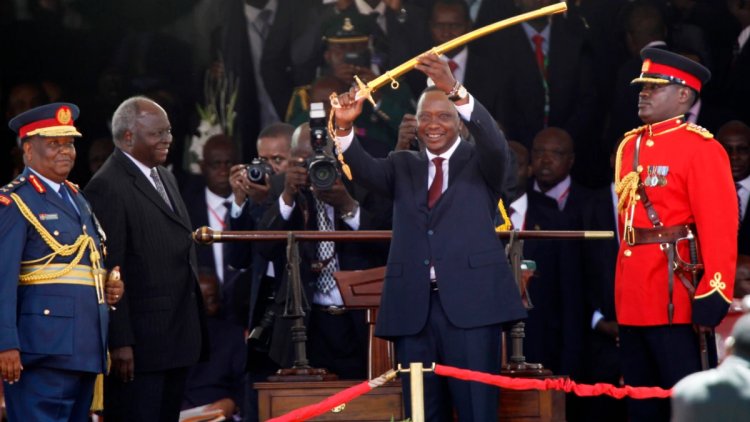What Will Happen To Uhuru's Powers From August 8 Till He Hands Over
There is a possibility that he could remain in office for longer...

President Uhuru Kenyatta will see some of his presidential powers cut down as Kenyans head into the election week that begins on Monday, August 8, which includes the August 9 elections.
The Head of State will enter a period whereby he cannot hire or fire any State or public official, nor confer any national honours. This is referred to as temporary incumbency and is stipulated in the Constitution of Kenya 2010.
In line with Article 134, the period will see him lose a number of functions automatically and the incumbency is divided into two parts.
"A person can hold temporary incumbency during the period commencing on the date of the first vote in a presidential election, and ending when the newly elected President assumes office; or

Court of Appeal and various Divisions of the High Court at State House, Nairobi for their Swearing-in Ceremony presided over by President Uhuru Kenyatta on Friday, June 4, 2021. /PSCU
"While the President is absent or incapacitated or at other times contemplated in Article 147," read the article in part.
On the night of Monday, August 8, the president will be reduced to being just a caretaker president overseeing government operations until he hands over power to the fifth president, which could take him up to late November if the presidential election is challenged successfully at the Supreme Court.
He will no longer have the power to nominate or appoint judges of the superior courts, nor to nominate or appoint any other public officer. The outgoing president also cannot nominate or appoint a person to public office according to the Constitution.
Despite him still being able to convene Cabinet meetings, the President can no longer nominate, appoint or even dismiss members of his Cabinet, Principal Secretaries or other State or public officers in government or public institutions, including ambassadors and diplomats.
Uhuru, for example, cannot appoint independent persons such as Independent Electoral and Boundaries Commission (IEBC), and Public Service Commission (PSC) among others.
He will also no longer have the power of mercy in pardoning any convicted offenders and confer honours such as the Order of Grand Warrior (OGW) and the Elder of the Order of the Burning Spear (EBS).
"On the petition of any person, the President may exercise a power of mercy in accordance with the advice of the Advisory Committee established under clause by granting a free or conditional pardon to a person convicted of an offence; postponing the carrying out of a punishment, either for a specified or indefinite period.
"Substituting a less severe form of punishment, or remitting all or part of a punishment," reads part of Article 133.
The President has been making use of his powers with the final days of his tenure. He recently appointed and swore in seven judges of the Court of Appeal and three months before, he appointed 24 Ambassadors, High Commissioners and heads of foreign missions.
On June 1 during Madaraka Day celebrations, Uhuru pardoned over 3,900 convicts; a function he can no longer exercise after the election day. On July 8, the Commander-in-Chief conferred what could easily be his final honours to 508 Kenyans.
Currently, he is presiding over the Trooping of the Color Ceremony, and the official opening the Kenya Army Band Headquarters and Defence Forces School of Music at the Lang'ata Barracks in Nairobi.
He still has the official commissioning of the Nairobi Expressway, his flagship project, and the commissioning of the Kisumu Shipyard Limited that has been building a new ship.
He is also expected to unveil a Police Level 4 Referral Hospital in Nairobi and the Kirigiti stadium in his home county of Kiambu.
Why Uhuru Could Stay Past August 9
There is a possibility that he could remain in office for longer, even if he loses some of his powers. By law, IEBC must declare the results of the presidential election by Tuesday, August 15, the week after the election process.
If no petition against the election outcome is filed at the Supreme Court, then the new President will be sworn in on Tuesday, August 30, paving way for President Uhuru to retire. However, if the presidential election outcome is challenged with a petition, such must be filed by Monday, August 22, holding that IEBC declares the results on August 15.

President Uhuru Kenyatta after taking over from the late former President Mwai Kibaki in 2013. /VOA NEWS
Should that happen, the Supreme Court will have 14 days to consider and determine the petition by Monday, September 5. If the election is upheld, the new president would be sworn in on Tuesday, September 13 allowing President Kenyatta to retire.
If the presidential election is nullified by the Supreme Court, a fresh election must be conducted by Friday, November 4 being the last day of a 60-day requirement. However, if the August 9 election does not produce a clear winner in the first round, a fresh election should be held within 30 days, meaning the top two contenders (Deputy President William Ruto and Raila Odinga) would battle each other again.






